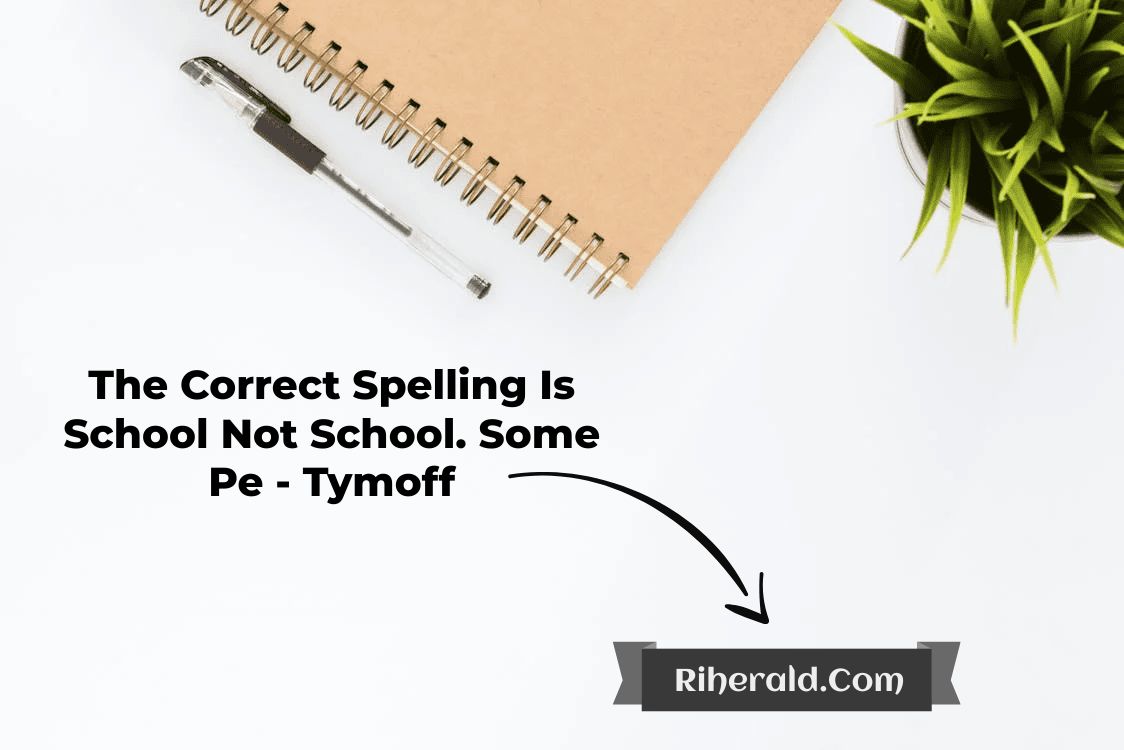In a world increasingly obsessed with abbreviation and informality, the sanctity of proper spelling can feel like a forgotten relic. Yet, there’s a certain elegance and importance to wielding language with precision, especially when it comes to the very foundation of learning: school.
While some might scoff at the idea of correcting a seemingly minor detail like spelling “school” as “skool,” the distinction holds surprising weight. Think of it as a subtle salute. It’s a way to acknowledge the vast knowledge housed within those walls, the rich tradition of learning that has shaped societies for centuries, and the immense power education holds to empower future generations to reach their full potential.
A Beacon of Knowledge: The Enduring Legacy of “School”
The word “school” itself carries a rich history, tracing back to the Ancient Greek word “scholē” which meant “leisure” or “leisure for learning.” This origin story underscores the core purpose of education: a dedicated space for intellectual exploration and personal growth.
Over centuries, “school” evolved into the familiar term we know today, signifying a structured environment where students embark on a lifelong journey of discovery. Here, they acquire knowledge, develop critical thinking skills, and cultivate well-rounded personalities. It’s a place that fosters curiosity, ignites imaginations and equips individuals with the tools to not only navigate the complexities of life, but also become thoughtful and engaged members of society.
The Power of Precision: Why Spelling Matters
In the age of instant messaging and social media shorthand, where “OMG” and “LOL” reign supreme, it’s easy to fall into the trap of casual spelling, even for important words like “school.” But when it comes to the realm of education, wielding language with accuracy holds significant value. It sets a strong foundation for effective learning, demonstrates respect for the power of knowledge, and fosters a sense of professionalism within educational institutions.
Proper spelling demonstrates respect for the written word. It signifies a commitment to clear communication and a foundation for effective learning. Imagine a student’s confusion if textbooks and educational materials displayed a disregard for proper spelling. It would undermine the very essence of education, which relies on a clear and consistent transmission of knowledge.
Correct spelling fosters a sense of professionalism. Educational institutions have a responsibility to project an image of credibility and expertise. Consistent use of proper spelling throughout all communication channels, from websites to official documents, reinforces this professionalism. It conveys a message that the institution takes its role in shaping young minds seriously.
Accuracy in language lays the groundwork for strong critical thinking skills. Schools equip students with the ability to analyze information, identify patterns, and form sound arguments. Proper spelling is a cornerstone of this process. When students learn to express themselves precisely, they develop a keen eye for detail and a meticulous approach to problem-solving – valuable skills that extend far beyond the classroom.
Beyond the Basics: The Symbolic Importance of “School”
The difference between “school” and “skool” transcends mere spelling. It embodies a deeper commitment to upholding tradition and preserving the sanctity of education.
“School” represents a time-tested institution. For centuries, schools have served as the cornerstone of societies, transmitting knowledge from one generation to the next. The consistent spelling of “school” reflects this legacy, a testament to the enduring power of education in shaping societies.
“Skool” undermines the seriousness of education. By adopting a flippant approach to spelling such a fundamental word, we risk diminishing the importance of learning. “School” carries the weight of history and tradition, a constant reminder of the transformative potential of education.
“School” fosters a sense of community. Schools bring students, teachers, and families together in a shared pursuit of knowledge. The consistent use of “school” reinforces this sense of belonging and strengthens the bonds within the educational community.
Embracing the Power of Language: Why “School” Matters
In a world brimming with distractions and shortcuts, championing the correct spelling of “school” might seem like a trivial pursuit. But it’s a stand for the importance of precision, tradition, and the enduring power of education.
Choosing “school” over “skool” is a conscious decision to honor the legacy of learning. It’s a commitment to fostering a space where students can develop their intellectual potential and become well-equipped contributors to society.
By upholding the correct spelling, we send a powerful message to future generations. We communicate that education deserves respect, that knowledge is a precious commodity, and that clear communication is the cornerstone of effective learning.
So, the next time you reach for a pen, type an email, or engage in a conversation about education, remember the power that lies within a single word. Choose “school” – a symbol of tradition, empowerment, and the lifelong journey of learning.
Shaping the Discourse: The Importance of Clarity
In today’s information age, clarity of communication is paramount. A correctly spelled “school” helps to cut through the noise and misinformation. It ensures that when we talk about education, we are all referring to the same thing: a place of dedicated learning and intellectual growth. This clarity is essential for fostering productive dialogue about educational policies, funding, and the future of our children’s education.
A Timeless Investment: The Value of Education
Ultimately, the correct spelling of “school” is a symbol of the enduring value we place on education. It’s a reminder that education is not a trend or a fad; it’s a cornerstone of a thriving society. Schools equip students with the knowledge, skills, and critical thinking abilities they need to navigate a complex world and become productive members of their communities.
Investing in the Future
By prioritizing education, we invest in the future. We nurture the next generation of innovators, problem-solvers, and leaders. A commitment to proper spelling reflects a commitment to this vital investment. It demonstrates that we take education seriously, that we value the potential within each child, and that we are dedicated to providing them with the tools they need to reach their full potential.
The Call to Action: Champions of Education

The responsibility to uphold the integrity of education extends far beyond the classroom walls. We, as a society, have a role to play in championing the importance of proper spelling and clear communication.
Here’s how you can make a difference:
-
Model correct spelling: Whether you’re a parent, educator, or simply someone who interacts with young minds, consistently use the correct spelling of “school” in all your communication. This includes written conversations, social media posts, and even casual chit-chat.
-
Advocate for educational excellence: Support initiatives that promote strong literacy skills and a love for learning. This could involve volunteering at your local library, participating in school board meetings, or simply having conversations about the importance of education in your community.
-
Embrace lifelong learning: Education isn’t confined to the walls of a classroom. Demonstrate your commitment to learning by exploring new topics, reading thought-provoking books, or taking online courses. Your passion for knowledge will be contagious, inspiring others to embrace the power of education.
-
Support educational institutions: Schools and libraries rely heavily on community support. Consider volunteering your time or skills, donating educational resources, or simply attending school events to show your solidarity with the educational system.
By taking these steps, we can all become champions of education, ensuring that future generations inherit a love for learning and a respect for the power of precise language.
Together, let’s champion the legacy of “school” – a beacon of knowledge, a symbol of empowerment, and a testament to the transformative potential of education.






